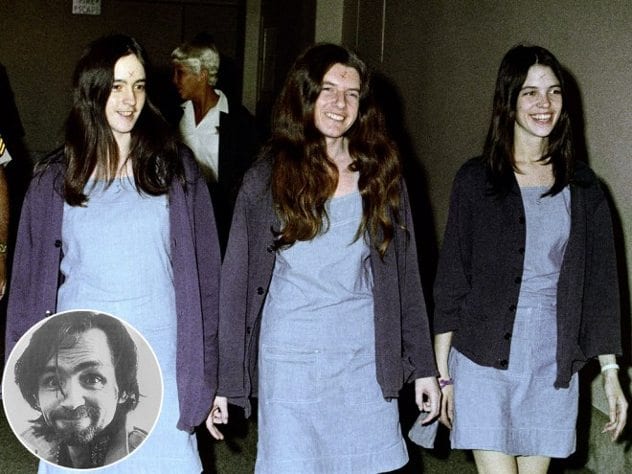 Movies and TV
Movies and TV  Movies and TV
Movies and TV  Our World
Our World 10 Places with Geological Features That Shouldn’t Exist
 Crime
Crime 10 Dark Details of the “Bodies in the Barrels” Murders
 Animals
Animals The Animal Kingdom’s 10 Greatest Dance Moves
 Movies and TV
Movies and TV 10 Box Office Bombs That We Should Have Predicted in 2025
 History
History 10 Extreme Laws That Tried to Engineer Society
 History
History 10 “Modern” Problems with Surprising Historical Analogs
 Health
Health 10 Everyday Activities That Secretly Alter Consciousness
 History
History Top 10 Historical Disasters Caused by Someone Calling in Sick
 Animals
Animals 10 New Shark Secrets That Recently Dropped
 Movies and TV
Movies and TV 10 Weird Ways That TV Shows Were Censored
 Our World
Our World 10 Places with Geological Features That Shouldn’t Exist
 Crime
Crime 10 Dark Details of the “Bodies in the Barrels” Murders
Who's Behind Listverse?

Jamie Frater
Head Editor
Jamie founded Listverse due to an insatiable desire to share fascinating, obscure, and bizarre facts. He has been a guest speaker on numerous national radio and television stations and is a five time published author.
More About Us Animals
Animals The Animal Kingdom’s 10 Greatest Dance Moves
 Movies and TV
Movies and TV 10 Box Office Bombs That We Should Have Predicted in 2025
 History
History 10 Extreme Laws That Tried to Engineer Society
 History
History 10 “Modern” Problems with Surprising Historical Analogs
 Health
Health 10 Everyday Activities That Secretly Alter Consciousness
 History
History Top 10 Historical Disasters Caused by Someone Calling in Sick
 Animals
Animals 10 New Shark Secrets That Recently Dropped
10 Psychological Reasons Why People Join Cults
From an outsider’s perspective, it is very difficult to imagine why anyone would join a cult of their own free will. There are thousands of cults in existence, with millions of members all over the world. According to multiple psychologists and sociologists, there is no stereotype of the sort of person who would join a cult. In fact, it could be any one of us, if we were not on guard to stop it from happening.
10Seductive Recruitment Process

According to an article written for the American Psychological Association by Dr. Philip Zimbardo, there is no “type” of person who joins a cult. In fact, many of these people are well-educated, sensible, and logical. He claims that anyone, under the right conditions, could be convinced to join a cult. So, instead of blaming the victims, he insists that people need to focus on how the founder of the organization managed to be so seductive, that they recruited their followers in the first place.
More often than not, a cult will promise to solve an issue in society that no one else is offering a solution to. Cults also offer a very structured lifestyle, with absolute answers about what is right and wrong. They are usually very open, loving, and welcoming. There are almost never any obvious red flags to warn people that they may unwittingly end up in a cult. The longer they stay, the more they receive promises for health, wealth, and well-being.
9Post-Breakup Blues

Just about everyone who has ended a romantic relationship can relate to both the positive and negative emotions that go along with a new chapter in life. Some people cope by jumping into a new relationship very quickly, while others celebrate their new-found independence. Some people, however, join a cult. Dr. Alexandra Stein points out that one common thread is that people are in a transition period in their lives.
Dr. Stein, who grew up protesting alongside her parents during the anti-apartheid movement in South Africa, goes on to explain that breaking up with her boyfriend was the catalyst for her to unwittingly join a cult in the United States. After she ended her relationship, she wanted to find a future partner who shared her passion for social justice.
In her 20s, Dr. Stein began to seek out political organizations who claimed to improve the lives of Americans needing health care and other issues. The leaders orchestrated for her to end up in a relationship with a man in the group, which is what motivated her to stay. She would work at her full-time job eight hours a day, and then the remainder of her life was spent living and working for the organization’s leader. Little did she know that she was being manipulated into isolation away from her family in South Africa, and she was trapped in a political cult for many years.
8Striving for Perfection

According to Dr. Stanley H. Cath of Tufts University School of Medicine, many people who join cults were raised in a family that attempted to teach them Christianity, Judaism, or another formal religion, and yet they rejected it. These people are not necessarily Atheists, but they refused to follow their family’s traditional beliefs because they felt there must be something better out there.
Striving for perfectionism comes into play in many cults. The vast majority of cults teach their followers that they are superior to non-cult members. This elitism gives people an “us vs. them” sort of mindset, which eventually leads to members becoming socially isolated from people living in the outside world. In treating ex-cult members, Dr. Cath noted that the vast majority of people who she had treated ended up joining a cult after having a long history of blaming other people in their lives for their problems. They usually do not take responsibility for their own faults, and they continue to move forward with their own goals of achieving perfection at all costs.
7Finding Purpose in Life

Almost everyone goes through an existential crisis at some point in their lifetime. Finding one’s identity and purpose in life can sometimes be a struggle, and a cult often gives people a cause that they can fight for. Whether it is attaining eternal life in a spiritual realm, or working day and night to change a political issue, a cult can give a purpose in life to people who did not have their own strong goals.
Dr. Adrian Furnham wrote about the many reasons why people join cults for Psychology Today. He explains that year after year, the world becomes more a complex place to live. In times of confusion and uncertainty when people feel lost, extreme groups offer absolute answers to questions that people have. Many people find comfort in seeing the world in terms of good and evil, right and wrong. Cult leaders offer simple solutions in a way that makes sense, and they know how to motivate people to devote their life to the leader’s cause. Adolf Hitler was very good at this. He motivated Germans who felt as though they had little left to live for after World War I, and it was enough to convince them to join the Nazi Party.
6Low Self-Esteem

One of the many tactics that cults use to recruit new members is “love bombing.” This is a technique where members of the group are overly loving and complimentary. To someone who has low self-esteem, this is a huge ego boost. To people who are not used to receiving a lot of love and flattery in their life, this is obviously a very seductive thing. Sometimes, if it is a religious cult, members are promised that in addition to receiving love from the human beings in the group, they will also receive a spiritual love and acceptance from a higher being.
However, once anyone begins to question or doubt the actions of the organization, this “love bombing” can quickly turn around. In order to punish anyone who questions authority, they subjected to public humiliation and social isolation. Fearing the loss of these new friendships and intimate relationships, people stop speaking out. The types of people who are most susceptible to this sort of manipulation are those who come from broken families and abusive relationships.
5Women Are More Likely to Join

From the three young women who were convinced to commit murder with Charles Manson, to the more recent three English High School girls who packed their bags to join ISIS, it would seem that women are more likely to join cults than men.
Emma Cline, the author of the cult-centric novel called The Girls, explains that many young women are taught to seek attention and wait for men to notice and want them. Boys are taught to reach their own goals and to plan for the future. So, joining a cult is a way for many young women to feel like they are seizing some kind of control over their destiny in an otherwise powerless life. The fewer opportunities a woman has in her life, the more likely she is to follow a charismatic cult leader.
According to Dr. David Bromley from the Virginia Commonwealth University, women statistically attend more religious gatherings than men, even if it is simply going to a Christian church on Sundays. So, in this respect, the fact that women join cults more often than men is not surprising.
4They Want Someone to Take Care of Them

Many cults also form communes, where members of the organization are promised free room and board in exchange for community service, prayer, and loyalty to the leader. For anyone searching for a Utopian society, or for those who are struggling economically, this can seem like an attractive option. Professor Arthur Deikman, of the University of California, San Francisco, points out that many people crave the security that a cult will bring, especially if they did not receive enough love and support from their parents.
These people want the protection of a parental figure who will save them from the outside world. Rather than living independently and being responsible for their own finances, housing, health care, and safety, cult leaders promise to take care of all adult responsibility in exchange for obedience. If these people have children of their own, their entire family becomes dependent on the cult leader. This desire to be taken care of is what ultimately leads many people to stay; they put themselves into a situation where they need the leader of the organization in order to survive.
3Trying to Save the World
Actress Leah Remini was raised in the Church of Scientology since she was nine years old. She was taught to believe that without Scientology, the world was doomed, and the fate of the entire planet was in their hands. Despite the fact that she witnessed so many atrocities committed by high-ranking church members, she still thought it was for the greater good since they were trying to “clear the planet.” On Scientology’s official website, the organization emphasizes how terrible the world is, with both natural and manmade disasters occurring on a daily basis. They claim that Scientology Spiritual Ministers are prepared all over the globe to help solve any problem at a moment’s notice.
According to Tom Cruise, “(A Scientologist) has the ability to create new and better realities, and improve conditions. Being a Scientologist, you look at someone, and you know absolutely that you can help them . . . Being a Scientologist, when you drive past an accident, it’s not like anyone else. As you drive past, you know you have to do something about it, because you know you’re the only one that can really help.”
It is true that members of Scientology have provided vital disaster relief. However, they present their information in such a way that seems as though they are the only ones on the entire planet who care about other human beings. For young, idealistic people who feel a deep need to make a difference in the world, this organization could be a very attractive prospect. It would be easy for someone with the best intentions to join the organization.
2Fed Up with Society

Kristina Jones, a woman born into a cult called The Children of God (Originally named “Teens for Christ”), wrote for the BBC about why some people decide to join these groups in the first place. Jones explains that after the horrible injustices her father witnessed during the Vietnam War, he felt as though he did not want to be a part of society anymore. Her mother, a devout Christian, decided to join the cult when she saw how much they sang and praised the joys of Jesus Christ. At 16 years old, she left her family, because she felt it was an exciting new way of life, compared to what society had to offer her. Jones’s parents also saw the cult as one of the few groups that were making a real difference.
The actor Joaquin Phoenix and his siblings were also born into The Children of God cult. In an interview with Playboy Magazine, he explains that their family fled the cult in 1977. That is why his parents changed their last named to “Phoenix” because they were able to rise from the ashes of the suppression of that life.
1They Have No Idea It’s a Cult

Dr. Margaret Thaler Singer devoted her life’s work to studying the psychology of brainwashing and cults. The majority of these people had no idea that the organization they were entering was, in fact, a cult. Most people do not realize that a cult does not necessarily have to be a religion. It could also be a political group, business, or lifestyle cult. Singer explains that brainwashing is something that often happens so gradually, that people have no idea what is going on.
Dr. Singer explains, “The cult leader grows wealthier and more powerful while trying to convey to the followers that he is helping them. But the main goal is to create more power and wealth for the leader, rather than the benefit of the followers.”
Critics of the athletic apparel company Lululemon Athletica have accused the corporation of being a cult. The founder, Chip Wilson, wanted to spread the ethics of the novel Atlas Shrugged, which teaches that self-interest should be the most important thing in society. The company teaches their employees that they are superior to others. Lululemon even pushed employees to use their meager retail-job paychecks to purchase expensive self-help seminars called Landmark Forum, with classes that cost from hundreds to thousands of dollars. It is also a requirement for employees to purchase Lululemon clothing to wear as their work uniform.
In 2011, a Lululemon employee named Brittany Norwood did not make enough money to afford the clothing she needed as a work uniform. She felt that her only option was to steal yoga pants. She was caught red-handed by one of her fellow co-workers Jayna Murray. Rather than risk losing her job at Lululemon, she murdered Murray in cold blood and tried to blame it on a robbery. Norwood was sentenced to life in prison without the chance of parole.
Shannon Quinn is a writer and entrepreneur from the Philadelphia area. You can also find her on Twitter @ShannQ








